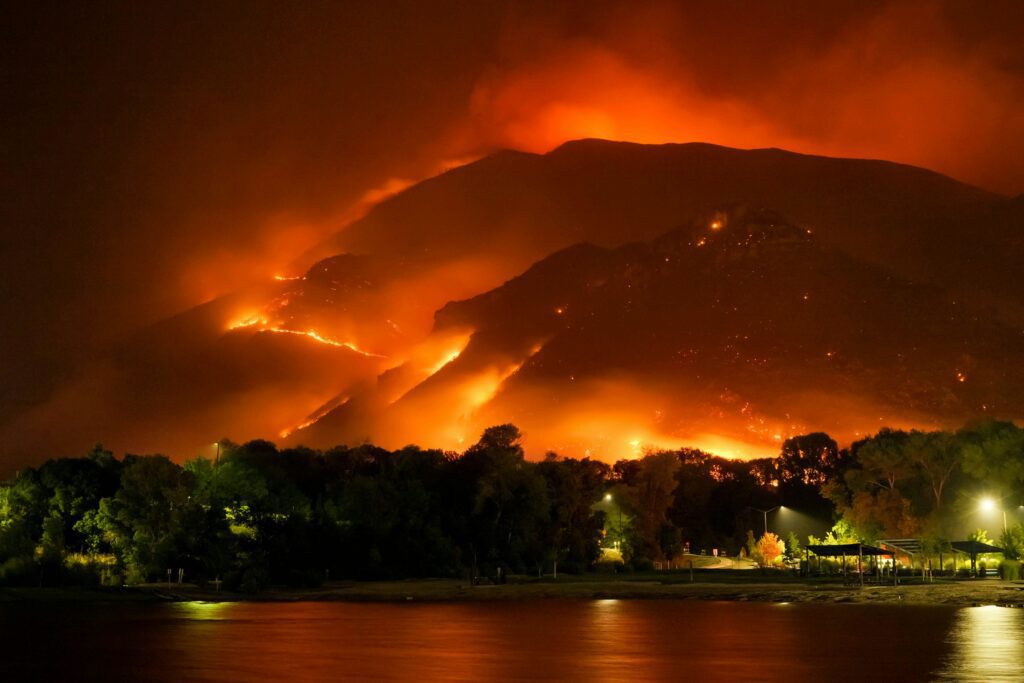What image do you conjure up when you hear the words “consuming fire”?
Given the current events at the time I write this in January 2025, the synonym “wildfire” seems fitting: Huge fires are still burning in the Los Angeles area of California. Thinking of those brings to mind descriptions like “terrifying”, “destructive”, and “unstoppable”.
Why would God be described as that kind of destructive force?
Judgment
From the LORD of hosts you will be punished with thunder and earthquake and loud noise,
Isaiah 29:6
With whirlwind and tempest and the flame of a consuming fire.
Many of the Biblical references are in the context of judgment. Once God releases His wrath on evil, nothing can stand in His way. He keeps going until justice is served, the wrong-doing is punished, and the evil is destroyed (Isaiah 30:27-30, Isaiah 33:14-15, Joel 2:1-11, Lamentations 2:3). The thought of standing in the path of that firestorm, of even being its very focus, is horrifying. Some may ask “Why would a loving God inflict that kind of pain, suffering, and destruction?”
That seems like a reasonable question, at first, but it really isn’t when we think about it more fully. I will counter with another question: “Why would I expect anything else?”
Remember: We are talking about the Supreme Authority who created the universe with a word and sustains it with His ongoing power. I have completely disrespected and deeply offended that Authority. I have disobeyed His direct commands. I have behaved as if He is not there, or has no right to have a say over the way I live. I act like my life is solely my own, and none of His business.
Why would I NOT expect to be consumed? Why on earth would I expect Almighty God to be reduced to a cozy campfire where I can roast marshmallows? That’s ridiculous!
I think it is natural and appropriate to be afraid of God’s fire destroying my sin, and me along with it. To most people throughout history, fear of retribution from whatever god they worshipped has been a common theme. When did Christianity’s emphasis on the love of God get watered down to mean He doesn’t still hate sin?
I say this not to scare anyone into hiding under their bed, or running to the nearest church for fire insurance. Rather, the more I think about God’s consuming fire of righteous judgment that I fully deserve, the more I worship Jesus.
I won’t experience that fire, because He already has … on my behalf.
To diminish that consuming blaze to a simple campfire is to also diminish the magnitude of Christ’s sacrifice. The fire of God’s wrath will never cool by even a single degree. His justice, holiness, and righteousness are infinite. But because His love, mercy, and grace are also infinite, Jesus stood in the gap and all the judgment fell on Him.
When we stand hidden in Him, the flame can’t reach us!

Refining
In this you greatly rejoice, even though now for a little while, if necessary, you have been distressed by various trials, so that the proof of your faith, being more precious than gold which is perishable, even though tested by fire, may be found to result in praise and glory and honor at the revelation of Jesus Christ…
1 Peter 1:6-7
There is a second kind of consuming fire that also seems relevant as an aspect of God’s character: The heat that is used to purify and mold substances for better use. For instance:

- The immense heat of a furnace used in refining precious metals burns away the contaminants and leaves behind only the pure silver or gold.
- A similar heat occurs in the furnaces used for glass-blowing. That one turns the solid glass base into a semi-liquid that can be molded into the form the glass-blower desires.
- The heat of a blacksmith’s forge has been used for centuries to form metal into usable tools.
- Kilns have been used for millennia to harden clay into pottery, tile, porcelain, etc.
- In my own family, my brother used to work in a foundry that formed liquid metal into cast-iron pipes and fittings.
In these cases, the fire adds descriptions like “purifying”, “shaping”, and “hardening”. It is fascinating to watch the lava-like flow of molten metal or glass. The power of heat to cause such a change is awe-inspiring. But I would imagine that the substance being changed is not all that fond of the process!
In a similar way, the Bible speaks of God forging His people into something beyond the raw material with which they begin. He tests to demonstrate the purity (or lack thereof) of our faith and trust in Him. Where that faith and trust is lacking, contaminated by sin as we all are, He employs a refining process to purge the flaws. He is changing not our outward form, but our inner hearts. At times, He uses the flames of hardship to do so (Zechariah 13:8-9, Proverbs 17:3, Jeremiah 9:7, Malachi 3:1-3).
- For ancient Israel, He used seventy years of captivity in Babylon.
- For Daniel, He used a lion’s den (Daniel 6).
- For Daniel’s friends, He used a literal furnace (Daniel 3).
- For Paul, He used a persistent problem (2 Corinthians 12:7-10).
- For the early church, He used persecution by the authorities and culture around them. He continues to use that in the lives of many Christians today, all around the world.
Even for Jesus, who had no impurities to be cleansed, there was a tremendous trial-by-fire that proved His love and commitment to fulfilling His Father’s plan (Hebrews 5:8-9).
Untouchable
And to the eyes of the sons of Israel the appearance of the glory of the LORD was like a consuming fire on the mountain top.
Exodus 24:17
A third way that fire describes a facet of God’s nature is that it is untouchable. To be too near it is to get burned. The fire is not trying to harm anyone. It just is what it is, and that is something incompatible with human touch. The Bible’s word for that is “holy“.
When Moses asked to see God’s face, the answer was that it was impossible. To do so would kill him. The closest God could offer was to hide Moses in the cleft of a rock and cover him with His hand until He passed by. Then Moses could get a glimpse of His back. Even that vision left Moses’ face glowing so much that the people were afraid to look at him. He had to wear a veil over his face until the glow faded (Exodus 33:18-23, Exodus 34:29-35).
Here again, Jesus comes to our rescue. Thanks to Him, we have the right to approach this holy God. We can look forward to an eternity of living directly in His presence! (Hebrews 4:14-16, Revelation 21:1-4)
Bottom Line
To try to understand a hint of God’s full character, we must look at all of His attributes. We can’t focus on His love to the exclusion of His righteousness and justice. Neither can we focus on His wrath to the exclusion of His mercy and grace. All are a part of the One True God! (Deuteronomy 6:4-5)
Note: A couple of similar articles on this site are “Fear of God” and “Wrath of God“.

